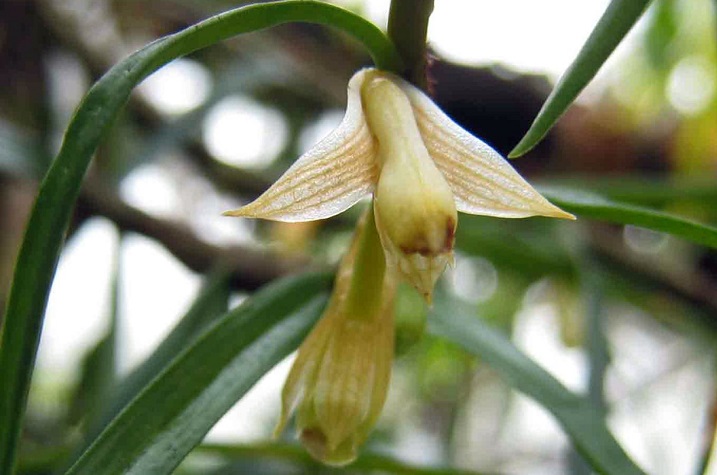Thailand Doctors Discover an Orchid-Derived Phytochemical That Shows Strong Potential Against Brain Cancer
Nikhil Prasad Fact checked by:Thailand Medical News Team Oct 08, 2025 4 months, 5 days, 16 hours, 43 minutes ago
Thailand Doctors: A New Hope from a Thai Orchid
A group of Thailand Doctors from Chulalongkorn University and Mahidol University have made a remarkable discovery that could one day help fight one of the deadliest brain cancers known to medicine. They identified a natural compound extracted from Dendrobium pachyglossum, a native Thai orchid, that powerfully attacks glioblastoma multiforme (GBM) cells — the most aggressive form of brain tumor in adults. The study was conducted by
Thailand Doctors and scientists from Chulalongkorn University and Mahidol University. A researcher from the University of Iowa in the USA also assisted with the study.
 Thailand Doctors Discover an Orchid-Derived Phytochemical That Shows Strong Potential Against Brain Cancer
Thailand Doctors Discover an Orchid-Derived Phytochemical That Shows Strong Potential Against Brain Cancer
The researchers discovered that the phytochemical compound, known as 4,5,4′-trihydroxy-3,3′-dimethoxybibenzyl (TDB), not only kills brain cancer cells but also boosts the effectiveness of temozolomide, the main chemotherapy drug used against GBM. Their findings suggest that TDB could become a potential future treatment for patients whose tumors have stopped responding to standard therapy.
Potent Anticancer Effects from a Common Orchid
The research team set out to explore whether this orchid-derived compound could work against aggressive brain tumors.
They tested TDB on human glioblastoma cells and found that it dramatically reduced tumor cell growth and survival. Within 72 hours of treatment, cancer cells showed significant decreases in viability and colony formation. The compound triggered programmed cell death (apoptosis) by activating the Bax protein — a key cancer-killing molecule — while suppressing the cancer-survival proteins Bcl-xL and Mcl-1. It also blocked an important growth pathway in tumor cells known as mTORC1/2, which is often responsible for treatment resistance and rapid tumor progression.
Blocking Tumor Spread and Improving Drug Effectiveness
Besides destroying cancer cells, TDB also slowed their ability to spread. Laboratory tests showed that even at low, non-toxic doses, the compound impaired cell movement and reduced the activity of proteins that help tumors invade nearby tissues. The researchers discovered that TDB suppressed epithelial–mesenchymal transition (EMT), a process that makes cancer cells more mobile and harder to treat.
Most impressively, when TDB was combined with temozolomide, it significantly amplified the drug’s tumor-killing effect. In tests using both laboratory-grown and patient-derived glioblastoma cells, the combination nearly wiped-out surviving cancer colonies. This finding points to a possible new way to overcome drug resistance in brain cancer patients who no longer respond to conventional therapy.
A Compound That Can Reach the Brain
One of the biggest challenges in treating brain tumors is that most drugs cannot cross the blood–brain barrier
(BBB) — a natural defense system that protects the brain from toxins. Using advanced computer simulations, the team found that TDB is likely to penetrate this barrier effectively. Predictions from four different models consistently classified TDB as BBB-permeable, suggesting it could reach brain tissue where it is most needed.
Promise for Future Cancer Therapies
According to the researchers, this discovery marks an important step toward developing plant-based treatments for brain cancer. They believe that the antioxidant and structural properties of TDB allow it to disrupt cancer growth, trigger cell death, and make tumor cells more sensitive to chemotherapy. However, they also noted that further studies — including animal testing and safety trials — will be necessary before TDB can be used in humans.
The study findings were published in the peer reviewed journal: Antioxidants.
https://www.mdpi.com/2076-3921/14/10/1212
In conclusion, the study highlights the extraordinary therapeutic promise hidden within Thailand’s native orchids. If future studies confirm its safety and ability to reach the brain, TDB could become a valuable natural weapon against glioblastoma and possibly other cancers. For now, this discovery gives new hope that a plant long admired for its beauty may one day save lives.
For the latest on
Thailand Doctors, keep on logging to Thailand Medical News.
Read Also:
https://www.thailandmedical.news/news/diet-change-slows-aggressive-brain-cancer-growth
https://www.thailandmedical.news/news/retinoic-acid-may-hold-key-to-weakening-glioblastoma-resistance
https://www.thailandmedical.news/news/exploring-natural-compounds-derived-from-peruvian-maca-lepidium-meyenii-to-tackle-glioblastoma-multiforme
